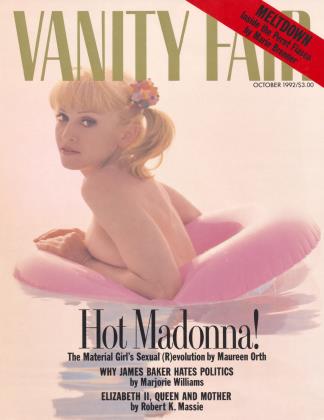Sign In to Your Account
Subscribers have complete access to the archive.
Sign In Not a Subscriber?Join NowThe Pope of Mope
Morrissey is angst-ridden, self-indulgent, and celibate. No wonder the kids love him
In a scant 37 minutes this summer, British rocker Morrissey sold out the 17,965-seat Hollywood Bowl. In Grand Rapids, Michigan, more than 2,000 fans besieged a record store after hearing a rumor—correct, as it turned out—that the skinny 33-year-old with the 50s quiff might make a personal appearance. Everywhere he goes, fans hand him gifts: flowers, inscribed books of poetry or fiction, handmade dolls that are perfect miniature simulacra of their idol.
Morrissey, whom a music-video director has described as "hunky, but angsty too," and who in his former incarnation as lead singer of the Smiths never had an album in the American Top 10, has tapped into the deep-flowing, benzoyl-peroxide-polluted psyches of both the pimple and the Prozac generations.
At the MTV studios, during an on-air question-and-answer period, Morrissey was asked his opinion of the works of Anne Sexton and Sylvia Plath. Most contemporary popsters would assume that Anne and Sylvia were hot babes, groupies, or supermodels. But Morrissey, lips pursed in their standard expression, halfway between a question and a kiss, pondered the query, sending his tongue scurrying around his mouth like a kitten trying to escape from a paper bag, and finally announced that he enjoyed Sexton's poetry, but found Plath to be overrated: "I think her life and death were more interesting than anything she wrote," he intoned.
Both question and answer tell a lot about the Morrissey phenomenon. Short of actually committing suicide, he has done everything possible to communicate to his fans that he is not just a foxy rock star but a soul mate. He is, by his own frequent admission, riven with loneliness, self-loathing, and depression. His health is uncertain. He gets ill, he says, because he doesn't eat. He doesn't eat because "I can only handle extremely basic food. Pasta is too sophisticated for me. It literally revolves around bread or potatoes and that's my lot, with the occasional orange thrown in."
Morrissey's much-vaunted celibacy—perfectly suited to this more cautious and solitary age—is as crucial a part of his image as Jagger's sexuality is of his. His past song titles give the feel of his preoccupations: "Heaven Knows I'm Miserable Now," "Girlfriend in a Coma." Titles on "Your Arsenal," his new album from Sire Records, include "You're the One for Me, Fatty" and "We Hate It When Our Friends Become Successful." Morrissey, in short, puts depression to music.
Sitting in his lavish suite at the Mark hotel in New York, Morrissey says, "I wouldn't imagine that George Michael [has to deal with such intense devotion]. I can't imagine anyone loving Madonna, and wanting to get onstage and hold her and squeeze her and not let go. She may sell millions of records, similarly George Michael, but I don't know if people really, really love them the way that I feel I am loved by the people who come and see me."
But what, exactly, do they see in him? "I think that there is a great sense that I have always been overlooked." By whom? "Oh, by the entire record industry and all their relatives."
At this, Morrissey has the good grace to laugh. He knows that his record company is trying heroically to make Arsenal a mass-market breakthrough. He knows that he will be touring the States this fall, filling good-size arenas. Last year, when he sold out the Los Angeles Forum, his fans spent an average $12 per head on Morrissey-related merchandise, a figure that is considerably above the industry average. Morrissey is a red-hot ticket.
As he went on his travels this summer, Morrissey was reading Oliver Twist. "Charles Dickens," he says, "is very exciting to me because he was a terribly gloomy character, terribly embittered and quite depressed."
He was also, I observe, terribly successful.
"Yes,'' agrees Morrissey, what a fantastic combination."
DAVID THOMAS
 View Full Issue
View Full Issue






Subscribers have complete access to the archive.
Sign In Not a Subscriber?Join Now